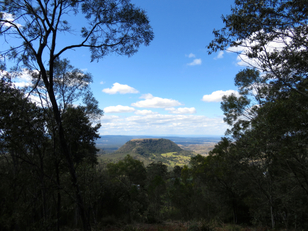
We've heard about a few mountains here in Australia, some of them local to Toowoomba and to Queensland, and about some mountains far away. Through our links with Nepal we have particular connections to the Himalayas and of course to the world's highest mountain, Mount Everest. Has anyone climbed a mountain that really required the proper gear, ropes and grappling irons and all those things?
Climbing a mountain requires a lot of effort, and preparation and discipline and persistence - which is why climbing a mountain is such a good picture for the spiritual life and often used as such. It is also why some traditional Christian communities are located near the top and on the very edges of mountainsides. Climbing requires patience and faith and provides a sense of perspective. When we physically get up higher we can see more; in the same way the more we advance in our relationship with God the better perspective we have on what really matters in life...
In the Old Testament, the mountains of Sinai and Zion are most significant. Mount Sinai, of course, is associated with Moses and is the place where Moses received the gift of the Law, the Ten Commandments. Thus, Mount Sinai is a symbol of God’s Covenant with Israel. Zion, to the south, is the location of the Jerusalem Temple. In the Gospels Jesus appoints the Twelve on a mountain. In Matthew’s Gospel, Jesus delivers the Beatitudes in his Sermon on the Mount, conjuring an image of Moses who received the Commandments on Mount Sinai. Matthew’s mostly-Jewish audience would immediately pick up on the comparison between Moses and Jesus. Matthew, in particular, has 6 significant mountain “scenes” in his gospel: Jesus’ temptation (4:8); the Sermon on the Mount (5:1); a number of healings (15:29); the Transfiguration (17:1); Jesus’ final discourse (24:1); and the commissioning of the Apostles (28:16). Perhaps the most significant mountain scene in the Gospels, however, is the Transfiguration of Jesus. Jesus is accompanied by Moses and Elijah, who themselves encountered God on the mountaintop in the Old Testament. Now, they encounter God through Jesus and Jesus, in turn, is seen as the fulfillment of the Law (Moses) and the Prophets (Elijah). So as Christians we are used to mountains being a place of encounter with God.
And so it is in the gospel reading we heard today as the risen Jesus sends his disciples to preach the good news to all creation. Now this in many ways a somewhat suspect reading, in that it is only one of a number of possible endings to Mark's gospel, and certainly has some problematic features- I do not think it would be wise for most of us to try picking up snakes or drinking poisons for instance! However the instruction to preach to the whole of creation - not just the humans, but every aspect of creation from the worms to the planets, is one that we can all take to heart. For it relates to the whole idea of a constantly renewed creation, in which we co-operate in the ongoing creativity of God, expressed as far back as the reading we heard from Isaiah. For God did not simply create the world and then leave us all to our own devices. Rather the promise of the scriptures is that God is always working with us to restore, renew and reconcile until all are brought into harmony and hurt and destruction are at an end.
This is a great way to bring to a close our celebration of the Season of Creation, recognising that as Paul said, 'nothing can separate us from the love of God' and no matter how steep the climb may sometimes seem to be, God is always climbing with us. Amen.
by Penny Jones, for Sunday 27 September 2015
 RSS Feed
RSS Feed